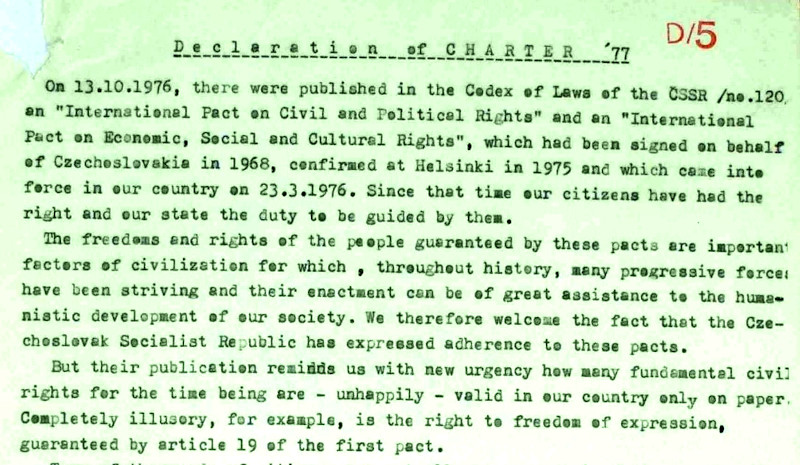Politics and History – Charter 77
You don’t have to spend too much time watching Czech news to learn that famous people have died. Sometimes however the name is followed by a simple phrase “Charter 77 signatory”. In our current time of being able to say pretty much whatever we like and not have to go to prison for saying it, this little phrase serves as a reminder to Czechs of what it used to be like. To give its full title “the Declaration of Charter ’77”.

The Charter 77 Document
The original of this document has probably been long since destroyed as I’ll explain later but if the Communists thought that its destruction would in some way bury the issue then they were wrong. In English, the “Declaration of Charter ’77” is a mere 1764 words. In typed Czech it barely fills 4 sides of A4. It’s consequences would be felt for the next 25 years and I’m still writing about it nearly 50 years later.
What’s in the Declaration of Charter ’77?
The funny thing is that in it’s base form it’s just a reminder. The main trigger was in Helsinki in 1975 where a two year process of trying to reduce tensions between East and West was coming to a conclusion and all European political leaders (except Andorra and Albania) plus USA and Canada attended and agreed a wide ranging set of guidelines. Importantly, this is where Czechoslovakia officially signed up to two covenants. They were the International Covenant on Civil and Political Rights and the International Covenant on Economic, Social and Cultural Rights. These covenants and wider ranging guidelines are commonly referred to as the Helsinki Accords.
Although non-binding, the Helsinki Accords were recognised by the CSSR Federal Assembly on 23rd March 1976 and included in a codex of Czech laws on 13th October 1976. By December 1976 the draft of the Charter 77 was agreed. Written on New Years Day 1977 the Charter was first published five days later on January 6th 1977 (hence the name) with 242 signatories from all walks of life. They were simply pointing out to the Communist regime the Civil, Human, Religious, Political and Cultural commitments that the country had made and the national obligations that resulted from those commitments. Future President Vaclav Havel and colleagues tried to present the original document to the CSSR Federal Assembly but it was confiscated and likely destroyed. That did not stop the contents being published in the free press all over the world including the Times of London, New York Times and Le Monde.
The Reaction to Charter 77
The actual document and any copies were declared “illegal” and it was a punishable offence to be in possession. The 242 signatories and anyone caught disseminating the document faced years of persecution. Many faced punishment including having citizenship revoked, being forcibly exiled, dismissal from work, denial of educational opportunities for their family, detention and imprisonment (as I write this post in 2024 the government has only just increased the pensions of those persecuted having been lower than average because they were not allowed to work).
Within Czechoslovakia, Charter 77 was not widely copied 1) because people viewed it as a “Prague” thing and 2) because of the punishments for being caught with it. Strangely, many people outside of Prague first became aware of the Charter 77 because the Communists went out of their way to say how anti-state it was and how the people associated with it were enemies of the state. People would be able to hear the Charter 77 text by listening to broadcasts on Radio Free Europe and Voice of America. Only 1882 people are known to have been official signatories of the document. After the fall of the Communists the first democratically elected government under Vaclav Havel included many of the Charter 77 signatories.
Take a few minutes to Read the PDF “Declaration of Charter ’77” Document. Absorb it’s contents and realize what was concerning Czechs then is still happening to Russians today. Understand the bravery of people who signed it to improve the lives of the population at the cost of their own lives and wellbeing.
Something Related or a Few Minutes Away
History – The Communist 1948 Coup
Famous Czechs – President Vaclav Havel
